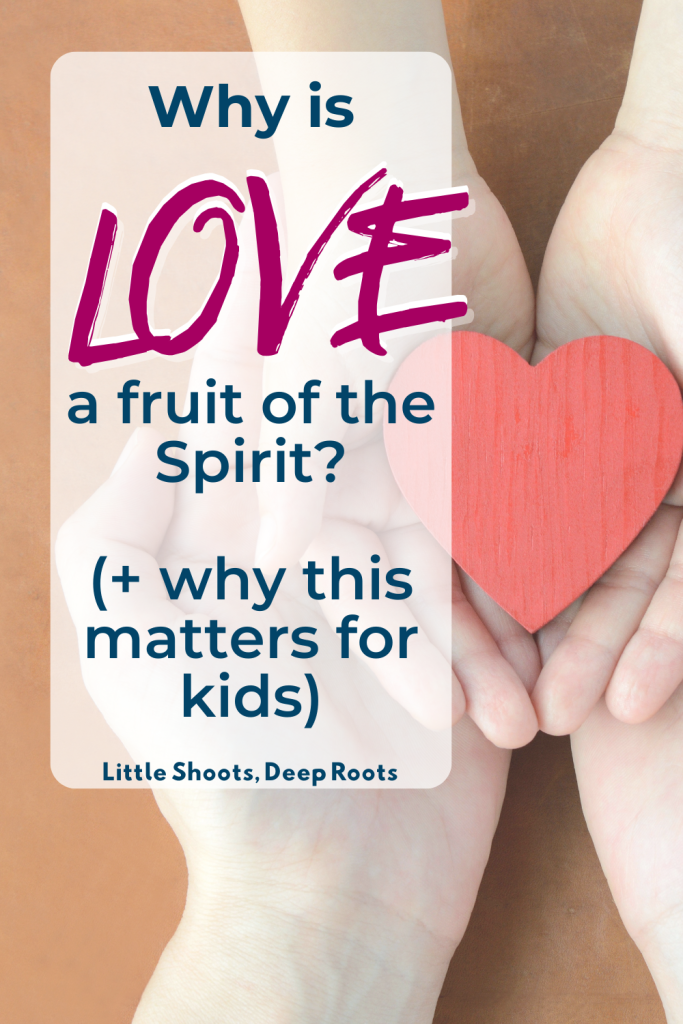WHY DOES GOD LOVE YOU? (The fruit of Love lived out in everyday life)

As an Amazon Associate I earn from qualifying purchases. This post may contain affiliate links. See my full disclosures, Terms of Use, and privacy policies on my “privacy” page. I never recommend a product I don’t love.
The fruit of Spirit is love, but what does that mean for a child in everyday life? Read on to find out, as well as discover a family devotional book on the fruit of the Spirit.
My son lay under a mound of blankets as I stretched out beside him. Every night I climbed the ladder to his top bunk and spent time praying over him before he went to sleep, but tonight I had something extra in mind.
“Son,” I asked, “why does God love you?”
He gazed at me through long lashes, finally giving a shrug.
“Does he love you because you’re good at math?” I asked.
He shook his head.
“No,” I said, “you are good at math, but that’s not why God loves you.”
“Does God love you because you’re kind to your brothers?”
Again, no. “You are kind to your brothers, but that’s not why God loves you.”
“Does God love you because you’re good?”
He nodded, and my heart stuttered. Did this sweet child of mine truly believe that God loved him because he was good? I hurried ahead with my next statement.
“You are usually good, but that’s not why God loves you. God loves you because you’re his child. And since you can never stop being his child, he can never stop loving you.”
His eyes grew round as the truth of God’s unconditional love permeated his heart. He discovered that God’s love for him wasn’t dependent on him, but on God.
I felt horrible that his misunderstanding had gone unnoticed until he was seven, but grateful for God’s prompting to share with him that evening.

THE TROUBLE WITH VIRTUE-TRAINING
In our zeal to raise Christian kids who don’t conform to the pattern of our fallen world, we often overemphasize the importance of their behavior. We tell them “Jesus is sad when you disobey” and teach them about the fruit of the Spirit as if they’re virtues to memorize.
The trouble with that approach is that we completely miss the gospel.
What is the Gospel anyway?
The gospel is the good news of how God sees you and treats you.
Not only did God make you, he adores you. But you (and everyone else on this planet) have sinned. It breaks the relationship between you and God because he is holy. God’s holiness and your sinfulness are like oil and water. They just don’t mix. God fixed it from his end, by coming as a man to remove the power of sin over us through his death and resurrection. He invites you into a relationship with him. Your job is to believe in his love. Accept his forgiveness, then put your hand in his and let him help you choose Love every day.
The gospel brings so much freedom—to our kids and us. It frees us from the expectation that they’ll behave well (because honestly, they’re sinners, just like us!) and it reminds us to depend on God for our goodness. It also reminds us that the Holy Spirit is ready and willing to help us grow in virtue, rather than us trying in our own power to become better people.
THE FIRST FRUIT OF THE SPIRIT
Somehow, I had unintentionally communicated to my son that his worth was based on his goodness, rather than goodness being a fruit of his relationship with Christ. I’ve been rectifying that ever since, reminding all my boys that they are deeply, unconditionally loved.
Love is the first fruit of the Spirit for a reason: everything stems from the love the Father, Son and Holy Spirit have for each other. The Bible teaches that God loved the world so much that rather than leaving us to wallow in sin and shame, he came to us, becoming God-With-Skin-On.
This God-With-Skin-On was both completely human, with our emotions and tendency to get skin and injured, but also completely God, which enabled him to live a sinless life.
When we focus on Jesus’s surprising, astounding, never-ending love for us instead of on our own virtue (or lack thereof), then we start to truly grow in the fruit of the Spirit.
- We grow in love because we know how beloved we are.
- We grow in joy because we know our God sings joyful songs over us.
- We grow in peace because we trust in Jesus’ nearness in our scariest moments,
- and we grow in the other fruits because we live with a settled sense of God’s love for us rather than fear and guilt.
In his letter to the people of Ephesus, Paul wrote:
“And I pray that you, being rooted and established in love,may have power, together with all the Lord’s holy people, to grasp how wide and long and high and deep is the love of Christ, and to know this love that surpasses knowledge—that you may be filled to the measure of all the fullness of God.”
Ephesians 3:17-19 ESV
It’s not just in knowing about the love of Christ, but through being utterly rooted and grounded in his all-surpassing love, that we are filled to the measure of all the fullness of God. And to truly root and ground our children in Christ’s all-surpassing love, we have to know him.
The best way to do that with children is to read the Gospel accounts. Read them all, and keep asking each other what each passage shows you about God. I promise, you’ll never be the same.
As the words of the old hymn say,
“O soul are you weary and troubled
No light in the darkness you see
There’s light for a look at the Savior
And life more abundant and free
Turn your eyes upon Jesus
Look full in his wonderful face
And the things of earth will grow strangely dim
In the light of his glory and grace.”Helen H. Lemmel
Christie Thomas is a homeschool mom of 3 and former Children’s Ministries Director. She is the author of several books for Christian kids, including the new, Christ-centered devotional, Fruit Full: 100 Family Experiences for Growing in the Fruit of the Spirit.






